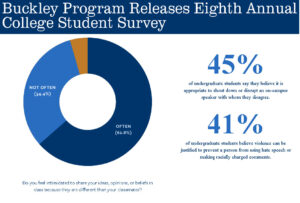
This study, the eighth iteration commissioned by the William F. Buckley, Jr. Program at Yale, scrutinized 803 full-time undergraduate students’ attitudes and perceptions across the United States.
Some of the highlights of the study include:
- Slightly less than half (49%) say the U.S. Constitution is a very important document for our country compared to 36% who say it is outdated. This is the lowest “Important” response over four years and the first time it has dropped below 50%.
- Despite a decline in the perceived importance of the Constitution, students continue to believe by a significant margin of 80% to 12% that the First Amendment is an important amendment that still needs to be followed and respected rather than it being outdated and can no longer be applied in today’s society.
- Nearly six in ten (58%) say they have often felt intimidated in sharing their ideas, opinions or beliefs in class because they were different than those of their professors, while 38% have not often felt intimidated. This is a noteworthy shift from past years and the highest ever recorded response of perceived intimidation.
- A higher 63% have often felt intimidated in sharing their ideas, opinions or beliefs because they were different than their classmates or peers, while 34% have not often felt intimidated. Again, this is this highest ever recorded response of perceived intimidation.
- When given a list of hot-button issues, students are again most likely to cite politics (48%) as a topic they are uncomfortable speaking about or are off limits for discussion. This response is 10-points higher than last year. Only one in five (19%) say no topic is off limits for discussion in the classroom, down nine-points from last year.
- For the first time, a plurality now disagrees that hate speech, no matter how racist or bigoted it is, is still technically protected under the First Amendment as free speech. Forty-four percent (44%) agree, which is the lowest response to date.
- Forty-four percent (44%) agree that it is sometimes appropriate to shout down or disrupt a speaker on campus, while 47% disagree. This is the highest “agree” response to date.
The research took place from August 29th to September 5th, 2022, with respondents all aged under 25 and enrolled full-time in private or public four-year colleges or universities. To ensure the data’s integrity and relevance, students attending two-year schools, technical schools, junior colleges, trade schools, part-time students, or those over 24 were excluded from the survey.
The survey was conducted online, with participants selected and screened from a broad, representative platform of individuals willing to participate in online surveys. To ensure the study’s results accurately reflected the demographics of the American four-year, full-time undergraduate population, the data was stratified by age, race/ethnicity, gender, and geography. This stratification was carried out using the National Center for Education Statistics Report (2018) as a reference, which approximates the target undergraduate population at around 8,156,367 individuals.
As the issue of free speech continues to dominate discussions in higher education, research such as this, backed by a highly respected organization like the William F. Buckley, Jr. Program at Yale, offers invaluable insight into the experiences and perceptions of those at the heart of the matter – our students. It remains crucial for academia, policymakers, and society to listen to and consider these voices as we continue to debate and shape the future of free speech in higher education.
This national survey has provided an essential snapshot into the current state of free speech on college campuses. Its findings will undoubtedly inform and guide ongoing dialogue and policy-making as we navigate the challenges of ensuring that colleges and universities remain beacons of open discussion, intellectual curiosity, and mutual respect.
